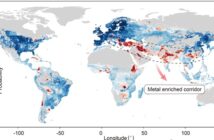Affinity Water has teamed up with leading environmental campaign groups to raise awareness with farmers on the need to adapt working practices to better protect the environment.
Catchment Manager for Affinity Water Alister Leggatt has spoken of how farmers need to “look to the future” to manage their land more sustainably in order to preserve scarce water resources alongside maintaining productive and profitable businesses.
At a recent meeting of the Chilterns Conservation Board he explained: “The water we do have in our catchments is incredibly valuable and it’s vital that farmers look to the future to manage their land more sustainably to meet the challenges faced in the water environment.
“The Chilterns area of outstanding natural beauty is a largely dry landscape and farmers’ have an important role to play in managing water resources to help protect and preserve the rare chalk streams in the Chilterns and beyond. The quality of both river water and groundwater can also be affected by farming practices leading to issues for both public water supply and wider ecology such as nitrates leaching into the soil.”
Mr Leggatt’s talk was one in a series of talks with leading experts organised throughout March 2021 for the Farming and Environment in the Chilterns: Preparing for the Future series.
The webinars were designed to help farmers understand changes that are being proposed in the new 25-year Environment Plan and the Agriculture Bill, and have been chaired by Ian Waller (Chilterns Farmer, Chilterns Conservation Board member and Chair of the Central Chilterns Farmer Cluster).
More than 150 people tuned in to listen to Alister talking about the challenges Affinity Water faced as a water company and the solutions and interventions they are working with farmers to implement to protect and enhance their soils and protect its water resources.
Alister explained how Affinity Water had again teamed up with Cambridge Water, EnTrade and the Farming and Wildlife Advisory Group East in North Hertfordshire and South Cambridgeshire to develop a marketplace to fund farmers in growing cover crops.
He said: “We are becoming increasingly aware that regenerative agriculture practices such as keeping soil covered with a diverse range of crops all year round, building soil organic matter and reduced or no tillage of the soil can all have massive benefits to the wider environment, water resources and the productivity of soil. We plan to strengthen the success of the 2019 and 2020 cover crop auctions, which were targeted at reducing nitrate leaching from agricultural land and reduced nitrate leaching in vulnerable groundwater catchments by nearly 60 tonnes over the 2 years. We will again be working the EnTrade platform and a reverse auction to target a wider area and explore the wider ecosystem services benefits that can be realised.”
Mr Leggatt’s presentation included an overview of:
- Cover crops to reduce nitrate leaching and wider environmental benefits
- Ways to reduce problem pesticides getting into water
- The importance of covering bare soil over winter to protect water quality and improve groundwater recharge
- How to improve soil health
- Biodiversity and farm sustainability
- Innovative research and studies we’re involved with.
Mr Leggatt thanked the Chilterns Conservation Board for inviting him to speak: “It was great to be able to discuss some of the issues affecting the water environment, and to share what the Affinity Water Catchment Team has learnt through our work and how measures to improve soil health and husbandry are going to be key to improving water quality.”
Following his presentation, farmers had the opportunity to ask Mr Leggatt questions.
The talk can be viewed here: https://affinitywaterltd.sharepoint.com/sites/home/SitePages/Water-friendly-farming.aspx




